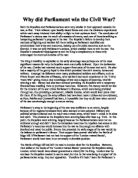Furthermore, the areas that were in the hands of Parliament over the duration of the civil war were more populous, wealthy and fertile than that of the Royalist’s. Parliament controlled the capital throughout the war; this was a divisive factor in its eventual victory. London was the trade centre of England, the port of London the busiest in the country and it was also the wealthiest city. Many of the other wealthy merchant cities and manufacturing cities remained loyal to parliament including Norwich and all the major ports other than Bristol which was in the hands of the Royalists. This meant that parliament had tight control over much of the trade in and out of land, which in turn meant more money from taxes for the war effort. The main armouries of Hull and the Tower along with most of the countries munitions factories also stayed in parliament hands which allowed them to equip men faster and with better equipment than the Kings army. Pay was also more regular in the army of parliament which meant a lower desertion rate.
Parliament’s hold over London gave them significant privileges, including drawing funds from excise duties and a large, easily taxed, mercantile class. On the contrary, the Royalist control lay over the poor, sparsely populated areas of the Country. This included Wales, the North, and portions of the South-West. In spite of of the victory of Parliament, in the beginning the Royalists were better off financially, despite their limited land held. Charles had a support base which was seventy five percent of the English Aristocracy, who funded the initial stages of the war effort by selling their own possessions and raising personal regiments of Troop and Horse; also Parliaments main means of finance was taxation which took time to assess and collect.
The Solemn League and Covenant with the Scots Presbyterian’s, signed in 1644, who in turn promised their aid against Charles l on the condition that the Scottish system of church government was adopted in England meant that the King then had two enemies to fight. There was a sudden appearance of allies on the scene and this was a great advantage for the Parliamentarians in securing the North.
The radical reform such as the Self Denying Ordinance 1645 proved advantageous to the Parliamentary cause. It was clear that Essex and Manchester were at best half-hearted in pursuing the fight against the Royalists. In response to this the Self Denying Ordinance was prepared, and after a secondary redraft, the bill outlined that required resignations from all members of both House's, but did not forbid reappointment of the officers. The Self-denying ordinance improved military unity by separating the quarrels in Parliament from the immediate operations of command. In practical terms, the Ordinance solidified the power of Cromwell and his "war party" faction.
The remodelling of the army of Parliament was a key factor in its eventual victories over the King. Although the Royalist army were also subject to a reshuffle, it wasn’t on the same level as the Parliamentarians. The New Models ethic of promotion through merit rather than good birth meant that high born officers with no experience were replaced with those of talent, leadership skills and experience whatever rank of birth they came from. Angela Anderson explains how the demands of the war brought forward harder and more radical leaders which ultimately led to a “military revolution.” As a result the army became the better managed and more disciplined fighting force in the field. “Parliament finally concentrated its considerable resources into a single, mobile and highly effective fighting force.”
Angela Anderson says how “the King was unable to capitalise upon his early advantages” he didn’t take the opportunity when he had the chance to. Anderson then goes on to say that “Secondly the position of parliament was not as disastrous as it appeared, and included certain long-term advantages if survival could be secured for long enough to capitalise on them.” Parliament wasn’t in a weak position at all despite what it may have seemed. The side of parliament were able to hold on for long enough to make a move in on the opposing side.
Parliament was simply more suited to war, more organised, and able to represent and plan all the things that are vital for military campaigns. The King was the big planner on the Royalist side, of course, but you could argue that he was less of a co-ordinated military thinker, and when compared with Cromwell, the born-again zealot, less driven. Team spirit of cause, good leadership and more than a little luck played its part in making the side of Parliament victorious.






